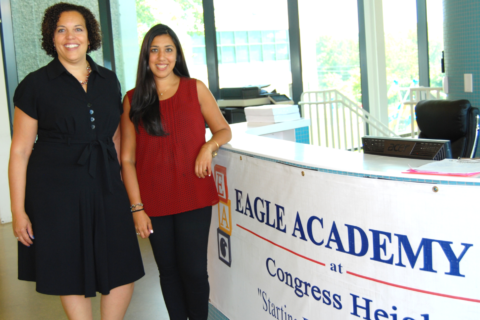WASHINGTON — Landing a full-time, suit-and-tie job after graduation is difficult for most college students. For those with disabilities, cracking into corporate life can be even harder.
One organization is hoping to change that.
Thirteen years ago, Susan Lang started the nonprofit Lime Connect after recognizing “a real gap in the disability employment space” for university-educated students.
“We also found that the number of students who were on campus who had disabilities that were not pursuing a corporate employment opportunity was very high,” said Lang, adding that about 30 percent of students with disabilities go through traditional corporate job recruitment channels.
“The remainder were perhaps going to work for a friend of the family … they would basically be underemployed. And then also, another segment might stay in school because that had become a safe environment,” she explained.
About one in 10 college students has a disability. Medical conditions, such as diabetes and fibromyalgia, fall into this category, as well as learning disabilities.
“[Students] may also have a mental health condition, and that is an area that’s really rising on campus today — a lot of anxiety and a lot of depression,” Lang added.
Lime’s goal is to help the 13,000 students and professionals, including veterans, in its growing network prepare for careers with leading corporations such as Google and Microsoft by coaching them on how to disclose their disabilities to co-workers and how to ask for accommodations to make sure they’re set up for success. Lime also helps students shatter long-standing stereotypes surrounding disabilities, and instead, focus on the strengths they bring to a company.
At an early age, Bloomberg Next President Mike MacKay was diagnosed with dyslexia. A few years later, he lost mobility in his right arm after an accident.
“Growing up with a disability was part of my life — both learning to deal with some of those challenges and also learning to leverage some of the unique benefits or value that I have to offer as well,” MacKay said.
Some of these benefits include MacKay’s ability to lead and foster collaboration. He credits both skills to living with a disability.
“Because of my dyslexia, there have been areas where I know I have specific weaknesses. So at an early age, I needed to know how to work as a team, bring other people in with strengths in areas that I had weaknesses … how to get people to understand my ideas and my vision so that I could get them to help me execute in certain areas,” said MacKay, who now serves on the board for Lime Connect.
On Nov. 3, Lime Connect is holding its inaugural Century Ride in Reston, Virginia. Cyclists can choose from a 100-mile, 66-mile or 30-mile course, and funds raised from the event will benefit scholarships, research and programming efforts at the nonprofit.
MacKay will be one of the few hundred riders participating in the event; he plans to pedal through all 100 miles.
“It’s not about feeling bad for people with disabilities,” he said. “It’s about helping them maximize their contributions, their performance, and being able to benefit from that — it’s really a win-win opportunity.”







